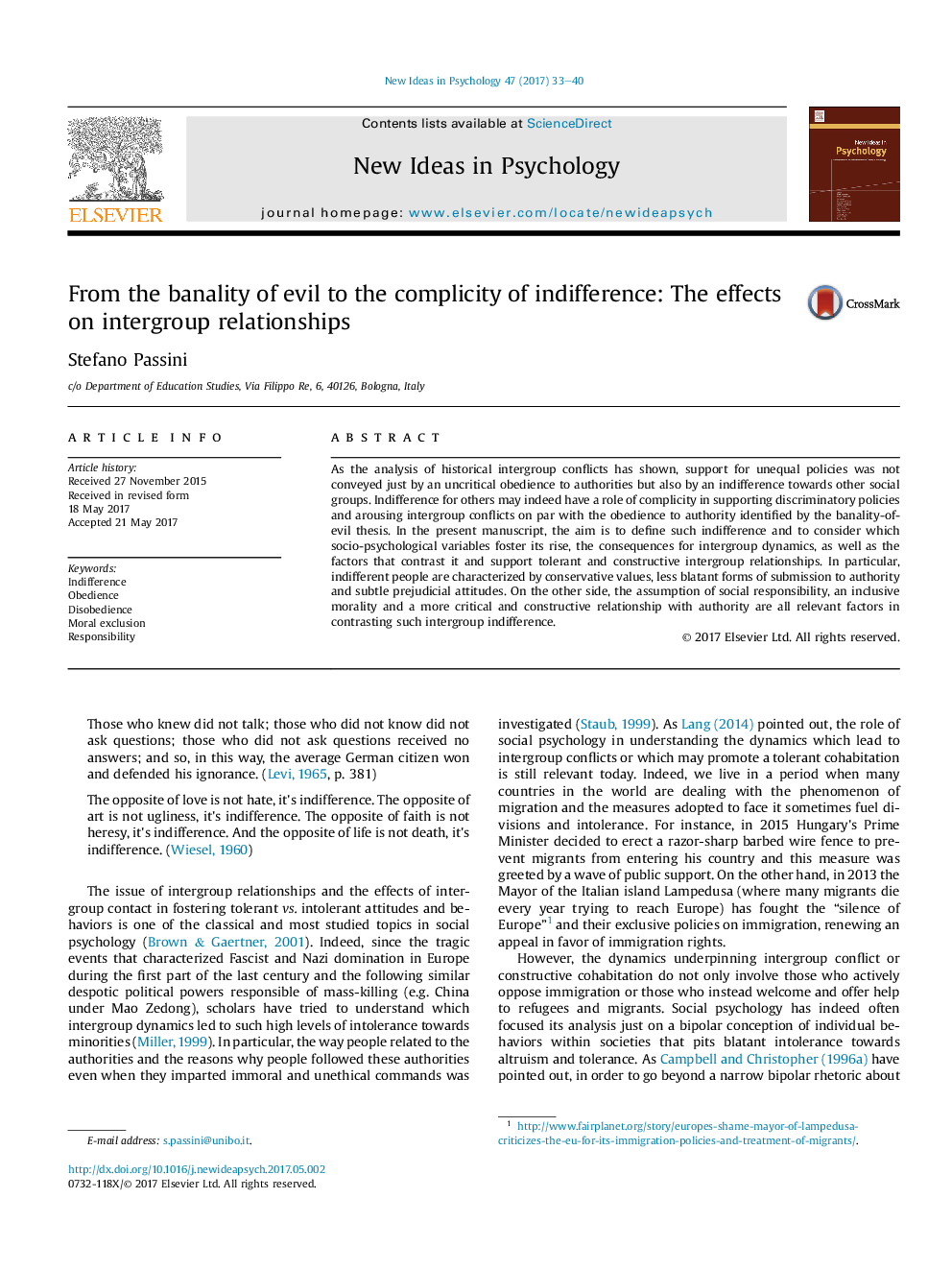| کد مقاله | کد نشریه | سال انتشار | مقاله انگلیسی | نسخه تمام متن |
|---|---|---|---|---|
| 4932954 | 1433740 | 2017 | 8 صفحه PDF | دانلود رایگان |
عنوان انگلیسی مقاله ISI
From the banality of evil to the complicity of indifference: The effects on intergroup relationships
ترجمه فارسی عنوان
از ظلم شرارت به همدستی بی تفاوتی: اثرات روابط بین گروهی
دانلود مقاله + سفارش ترجمه
دانلود مقاله ISI انگلیسی
رایگان برای ایرانیان
کلمات کلیدی
بی تفاوتی، اطاعت، بی خوابی، محرومیت اخلاقی، مسئولیت،
ترجمه چکیده
همانطور که تجزیه و تحلیل درگیری های میان گروهی تاریخی نشان داده است، حمایت از سیاست های نابرابر تنها با اطاعت غیر ارادی به مقامات و همچنین بی تفاوتی نسبت به سایر گروه های اجتماعی منتقل نمی شود. بی تفاوتی برای دیگران ممکن است در حقیقت نقش همدستی در حمایت از سیاست های تبعیض آمیز و ایجاد اختلافات میان گروهی را با اطاعت از اقتدار شناسایی شده توسط تزاحم ظالمانه بدانند. در مقاله حاضر، هدف این است که چنین بی تفاوتی را تعریف کنیم و در نظر بگیریم که کدام متغیرهای اجتماعی و روانشناختی، افزایش پیامدها و پیامدهای آن برای دینامیک بین گروهی، و نیز عواملی که آن را متضاد و حمایت از روابط میان گروهی تحمل پذیر و سازنده می سازد، افزایش می یابد. به طور خاص، افراد بی گناه با ارزش های محافظه کارانه، اشکال تلخ تسلیم تسلیم به اقتدار و نگرش های ناسازگار ظریف مشخص می شوند. از سوی دیگر، فرض بر مسئولیت اجتماعی، یک اخلاق فراگیر و یک رابطه انتقادی و سازنده با اقتدار، همه عوامل مربوطه در برابر چنین بی تفاوتی بین گروه است.
موضوعات مرتبط
علوم انسانی و اجتماعی
روانشناسی
روانشناسی رشد و آموزشی
چکیده انگلیسی
As the analysis of historical intergroup conflicts has shown, support for unequal policies was not conveyed just by an uncritical obedience to authorities but also by an indifference towards other social groups. Indifference for others may indeed have a role of complicity in supporting discriminatory policies and arousing intergroup conflicts on par with the obedience to authority identified by the banality-of-evil thesis. In the present manuscript, the aim is to define such indifference and to consider which socio-psychological variables foster its rise, the consequences for intergroup dynamics, as well as the factors that contrast it and support tolerant and constructive intergroup relationships. In particular, indifferent people are characterized by conservative values, less blatant forms of submission to authority and subtle prejudicial attitudes. On the other side, the assumption of social responsibility, an inclusive morality and a more critical and constructive relationship with authority are all relevant factors in contrasting such intergroup indifference.
ناشر
Database: Elsevier - ScienceDirect (ساینس دایرکت)
Journal: New Ideas in Psychology - Volume 47, December 2017, Pages 33-40
Journal: New Ideas in Psychology - Volume 47, December 2017, Pages 33-40
نویسندگان
Stefano Passini,
